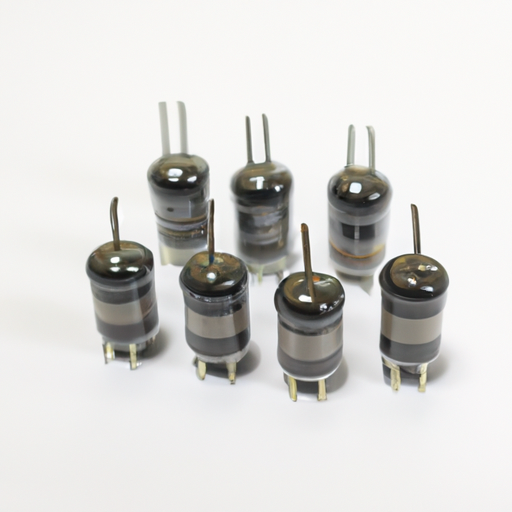What are the Advantages of Capacitor Capacity Products?
I. Introduction
Capacitors are fundamental components in electronic circuits, playing a crucial role in energy storage, voltage regulation, and signal processing. Capacitor capacity products refer to the various types of capacitors available in the market, each with unique characteristics and applications. Understanding the advantages of these products is essential for engineers, designers, and hobbyists alike, as capacitors are integral to the functionality and efficiency of modern electronic devices. This article aims to explore the benefits of capacitor capacity products, their applications, and future trends in capacitor technology.
II. Understanding Capacitor Capacity
A. Explanation of Capacitance and Its Measurement
Capacitance is the ability of a capacitor to store electrical energy in an electric field. It is measured in farads (F), with common subunits including microfarads (µF) and picofarads (pF). The capacitance value indicates how much charge a capacitor can hold at a given voltage. The relationship between charge (Q), voltage (V), and capacitance (C) is expressed by the formula:
\[ Q = C \times V \]
B. Types of Capacitors and Their Applications
Capacitors come in various types, each suited for specific applications:
1. **Electrolytic Capacitors**: Known for their high capacitance values, these capacitors are often used in power supply circuits to smooth out voltage fluctuations.
2. **Ceramic Capacitors**: These capacitors are popular for their stability and reliability, making them ideal for high-frequency applications such as RF circuits.
3. **Film Capacitors**: With excellent dielectric properties, film capacitors are used in audio applications and power electronics for their low distortion and high reliability.
4. **Tantalum Capacitors**: Known for their compact size and high capacitance, tantalum capacitors are commonly used in portable electronics and military applications.
III. Advantages of Capacitor Capacity Products
A. Energy Storage and Release
One of the primary advantages of capacitor capacity products is their ability to store and quickly release energy. Capacitors can discharge energy rapidly, making them ideal for applications that require quick bursts of power, such as in power supply systems. This quick discharge capability is essential in stabilizing voltage levels during sudden load changes, ensuring that electronic devices operate smoothly.
B. Voltage Regulation
Capacitors play a vital role in voltage regulation by smoothing out voltage fluctuations. In power electronics, capacitors help maintain a stable voltage level, which is crucial for the proper functioning of sensitive electronic components. By absorbing excess voltage during peak loads and releasing it during low demand, capacitors ensure that devices receive a consistent power supply.
C. Signal Filtering
Capacitors are essential in filtering out unwanted noise from signals. They can block direct current (DC) while allowing alternating current (AC) to pass, making them invaluable in audio and communication systems. By reducing noise and interference, capacitors enhance the quality of audio signals and improve the performance of communication devices.
D. Size and Form Factor
The miniaturization of electronic devices has led to a demand for smaller components. Capacitor capacity products come in various form factors, allowing designers to choose the right size for their applications. This versatility enables the development of compact devices without compromising performance, making capacitors a key component in modern electronics.
E. Reliability and Longevity
Capacitors are known for their durability and longevity, often outlasting other electronic components. They can operate effectively in various environmental conditions, including extreme temperatures and humidity. Additionally, capacitors generally have low failure rates, making them a reliable choice for critical applications where performance is paramount.
F. Cost-Effectiveness
Capacitor capacity products are often affordable, especially when produced in large quantities. Their cost-effectiveness makes them an attractive option for manufacturers, leading to long-term savings in maintenance and replacement. The low cost, combined with their reliability, makes capacitors a staple in both consumer and industrial electronics.
IV. Applications of Capacitor Capacity Products
A. Consumer Electronics
Capacitors are ubiquitous in consumer electronics, including smartphones, tablets, laptops, and desktops. They are used in power supply circuits, audio systems, and signal processing, ensuring that devices operate efficiently and reliably.
B. Industrial Applications
In industrial settings, capacitors are used in motor drives, automation systems, and power factor correction. They help improve energy efficiency, reduce power consumption, and enhance the performance of industrial machinery.
C. Renewable Energy Systems
Capacitors play a crucial role in renewable energy systems, such as solar inverters and wind energy systems. They help stabilize voltage levels and improve the efficiency of energy conversion, making renewable energy sources more viable and reliable.
D. Automotive Industry
The automotive industry increasingly relies on capacitors, particularly in electric vehicles and advanced driver-assistance systems (ADAS). Capacitors are used for energy storage, voltage regulation, and signal processing, contributing to the overall performance and safety of modern vehicles.
V. Future Trends in Capacitor Technology
A. Advancements in Materials and Manufacturing
The future of capacitor technology lies in advancements in materials and manufacturing processes. Researchers are exploring new dielectric materials that can enhance capacitance and reduce size, leading to more efficient and compact capacitors.
B. Emerging Applications in New Technologies
As technology evolves, new applications for capacitors are emerging. For instance, capacitors are being integrated into energy harvesting systems, wearable technology, and Internet of Things (IoT) devices, expanding their role in modern electronics.
C. Environmental Considerations and Sustainability
With growing concerns about environmental sustainability, manufacturers are focusing on developing eco-friendly capacitors. This includes using recyclable materials and reducing the environmental impact of production processes, ensuring that capacitor technology aligns with global sustainability goals.
VI. Conclusion
In summary, capacitor capacity products offer numerous advantages that make them indispensable in modern electronics. From energy storage and voltage regulation to signal filtering and cost-effectiveness, capacitors play a vital role in enhancing the performance and reliability of electronic devices. As technology continues to advance, the importance of capacitors will only grow, driving innovation and efficiency in various applications. Understanding the benefits of capacitor capacity products is essential for anyone involved in electronics, as these components are key to the future of technology.






